Small countries can help combat climate change
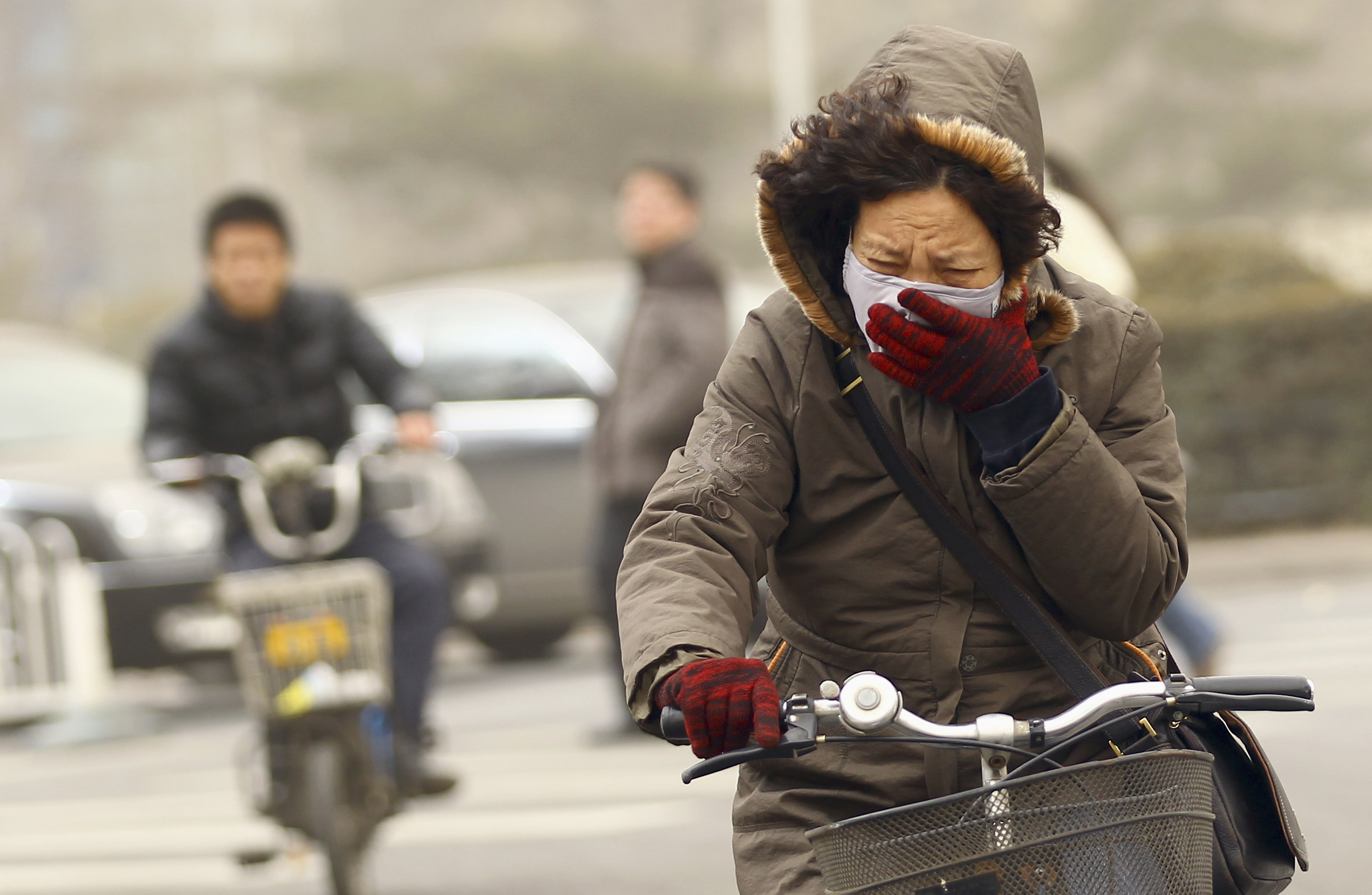
The latest report from the Intergovernmental Panel on Climate Change (IPCC) has emphasised once again the role humans play in global warming. Governments must now act to reduce emissions, but what can small countries like Switzerland do when their impact on the climate is close to zero?
Ioane Teitiota is the first, and probably not be the last, Pacific islander to file a request for asylum because of climate change. A native of Kiribati, he saw his home engulfed by the ocean.
The New Zealand authorities have yet to decide on his request. Whether it will be in Teitiota’s favour remains to be seen as no laws anywhere recognise global warming as a justification for granting asylum.
But there is no doubt that the rise in sea levels around the world is ultimately due to human activity. In its report, the IPCC said that it is now 95% sure humans are the main drivers of climate change for the past 50 years.
For the climatologists, the ball is now in the politicians’ court, but they shouldn’t dawdle along the way. Two thirds of the greenhouse gas “budget” – or the maximum amount of emissions allowed to limit the average temperature increase worldwide to two degrees Celsius – are already gone.
Action is expected first and foremost from the countries that produce the most carbon dioxide (CO2).
Switzerland, which accounts for just 0.1% of all global emissions, is a very minor player among the world’s polluters. Even if it axed all emissions, the consequences for the climate would be insignificant. So why bother at all?

In Switzerland, road traffic is chiefly to blame for CO2 and other emissions. “Cars and heating equipment emit not only CO2, but other pollutants as well,” added Greenpeace Switzerland spokesman Clément Tolusso.
Even if air quality is improving every year, the percentages of ozone, fine particles and nitrogen dioxide are still too high, according to the most recent report of the Swiss National Air Pollution Monitoring Network, published in early October. And in 2012, CO2 reduction targets in Switzerland were not reached.
“By reducing CO2 we will contribute to protecting the climate, which is in everyone’s interests. At the same time we protect our own health, which benefits us directly,” Tolusso pointed out.
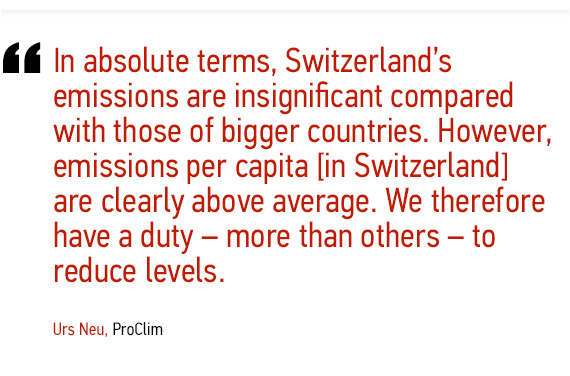
Every individual in Switzerland emits about six tons of CO2 a year. But to be closer to the truth, the figure should be higher, according to Urs Neu of ProClim, the Swiss Forum for Climate and Global Change. “The emissions generated by imported goods should also be taken into account,” he said.
In a 2010 study, researchers at the Carnegie Institution for Science in the US found that over a third of emissions associated with the consumption of goods and services in wealthy countries come from abroad. Some countries like Switzerland “outsource” over half their CO2, claimed the study’s authors.
Regula Rytz, a Green Party parliamentarian, believes that regulations are needed for imports. “For those goods, clear limits need to be be enforced, and CO2-contaminated products should be banned,” she said. In Switzerland itself, the transportation sector could be targeted, added Rytz, with “for example, introducing a CO2 surcharge on fuel, and tightening up the regulations on exhaust emissions from cars”.
But Christian Wasserfallen, a centre-right Liberal-Radical parliamentarian, reckons that Switzerland should avoid taking unilateral action that would only risk putting the country at a disadvantage. “To think that Switzerland can influence the climate is presumptuous,” he said.
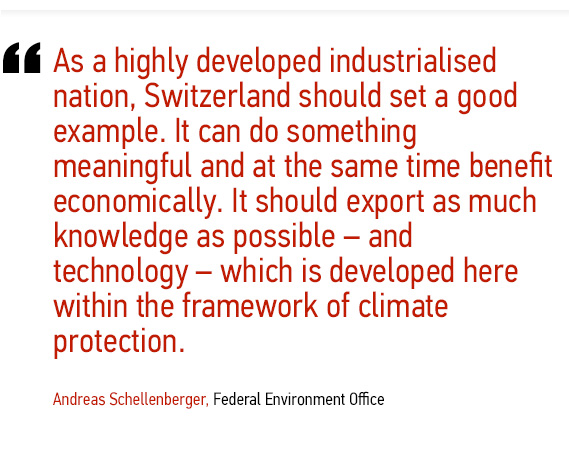
The 19th Conference on Climate Change, to be held in Warsaw from November 11 to 22, 2013, is intended to implement the decisions taken last year in Doha (Kyoto Protocol extended to 2020) and to define the structure of the regulatory framework to be adopted in future.
In particular, there is ongoing discussion about how to implement the Green Climate Fund, which is to raise $100 billion a year to further climate change policies in developing countries beginning in 2020.
In Warsaw, the Swiss delegation will push for measures to be adopted for a real reduction of greenhouse gas emissions. It is also proposing that the voluntary commitments of all countries be defined in a “precise and transparent” manner, according to the Federal Office for the Environment.
“The industrialised countries that have not signed up to the Kyoto Protocol should cut back their emissions to the same extent as the countries that have,” it said in a statement last month.
Specialists claim though there is no reason to hold back.
“In Switzerland climate research is at advanced stage,” stated Andreas Schellenberger of the climate division at the Federal Office for the Environment. “The knowledge, the technological capabilities and the financial resources are available: so [Switzerland] should take responsibility and reduce emissions.”
Switzerland and wealthy countries in general need to send “an extremely important signal” to the emerging nations, believes Jürg Buri, chief executive officer of the Swiss Energy Foundation. “They should show that it is possible to maintain a certain level of prosperity with lower emissions,” he added.
At the international level, Switzerland has often led the way, points out Franz Perrez, the country’s top climate negotiator. “It does so with concrete and credible proposals,” he said. “Last year at Doha, for example, we put forward a very ambitious proposal to limit carry-over of unused emission reduction certificates from one period to the next.”
It is also in the Swiss interest to be proactive. “Switzerland is particularly hard hit by climate change,” Perrez said. “Furthermore, if we leave the entire process in the hands of the biggest nations, I do not think we will see any significant progress [on climate change].”
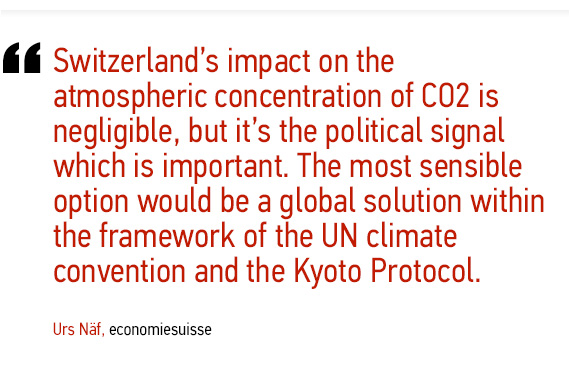
But if the Swiss want to convince other countries to adopt a coordinated climate policy, Switzerland must reduce its own emissions and publicise its decisions, pointed out Urs Näf, responsible for energy issues at the Swiss business federation, economiesuisse. “Taking responsibility for ourselves also sends out a strong signal at the international level,” he said.
In the meantime, it is important that small countries pressure the bigger nations, according to Perrez. Despite the reluctance of some governments, the Swiss negotiator is confident that progress will be on the cards.
“I believe in a binding world agreement,” he told swissinfo.ch. “It will probably be different from Kyoto, but I believe that we will achieve it by 2020.”
China, the US and Brazil are among the 20 countries emitting the most CO2. What can be expected of nations that have less influence on climate change? swissinfo.ch gathered the views of experts from the three countries:
Zhong Xiang Zhang, Fudan University of Shanghai and Chinese Academy of Sciences.
“In Chinese we have a saying: ‘Do not tire of doing little things for others; at times these little things have the biggest place in their hearts.’ Switzerland has always been very active at international events on CO2 emissions. Small countries can be models, especially in the political and technical spheres. An example would be Australia, where a country small in terms of emissions is helping China to develop an emissions trading scheme.”
Kathleen Miller, Environmental and Societal Impacts Group, National Center for Atmospheric Research. Boulder, Colorado
“Every ton of emissions has the same impact on the global climate as any other, regardless of who generated it, so it doesn’t make sense to excuse some countries from participating in the global effort to reduce carbon pollution if they have the technical and financial capacity to contribute to the effort.”
Edmo J. D. Campos, Oceanographic Institute of the University of Sao Paulo
“Small countries can provide good examples. Switzerland is recognised in Brazil for its responsible attitude. If it takes decisions on a particular issue, and if they are adequately publicised, there is a good probability that these actions will have a significant effect on Brazilian society too – and consequently on those making decisions.”
(Translated by Terence McNamee)

In compliance with the JTI standards
More: SWI swissinfo.ch certified by the Journalism Trust Initiative










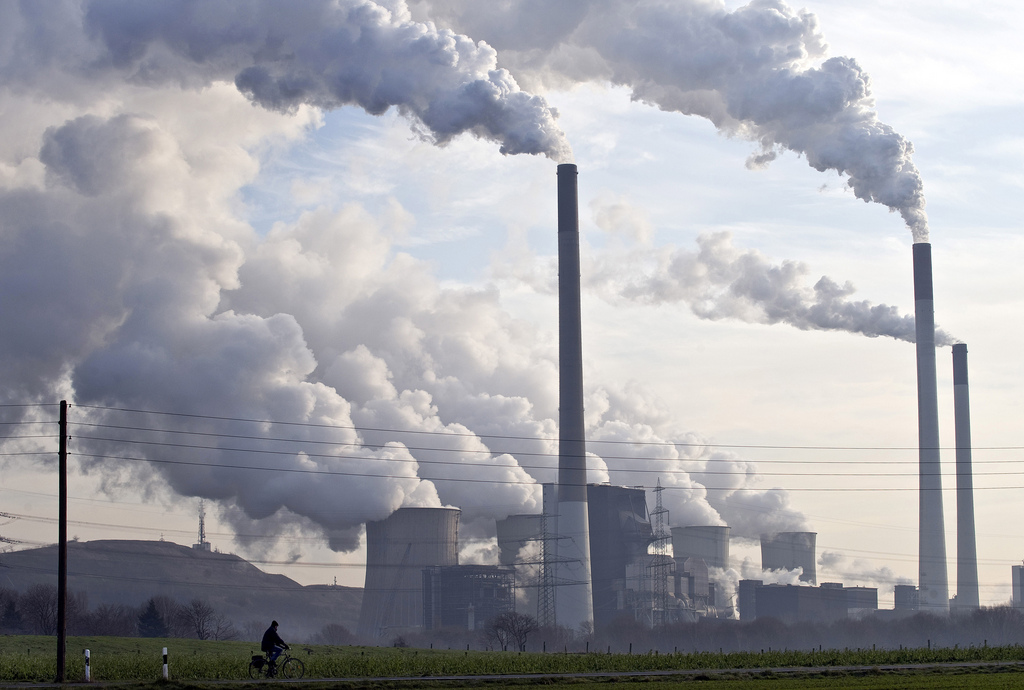
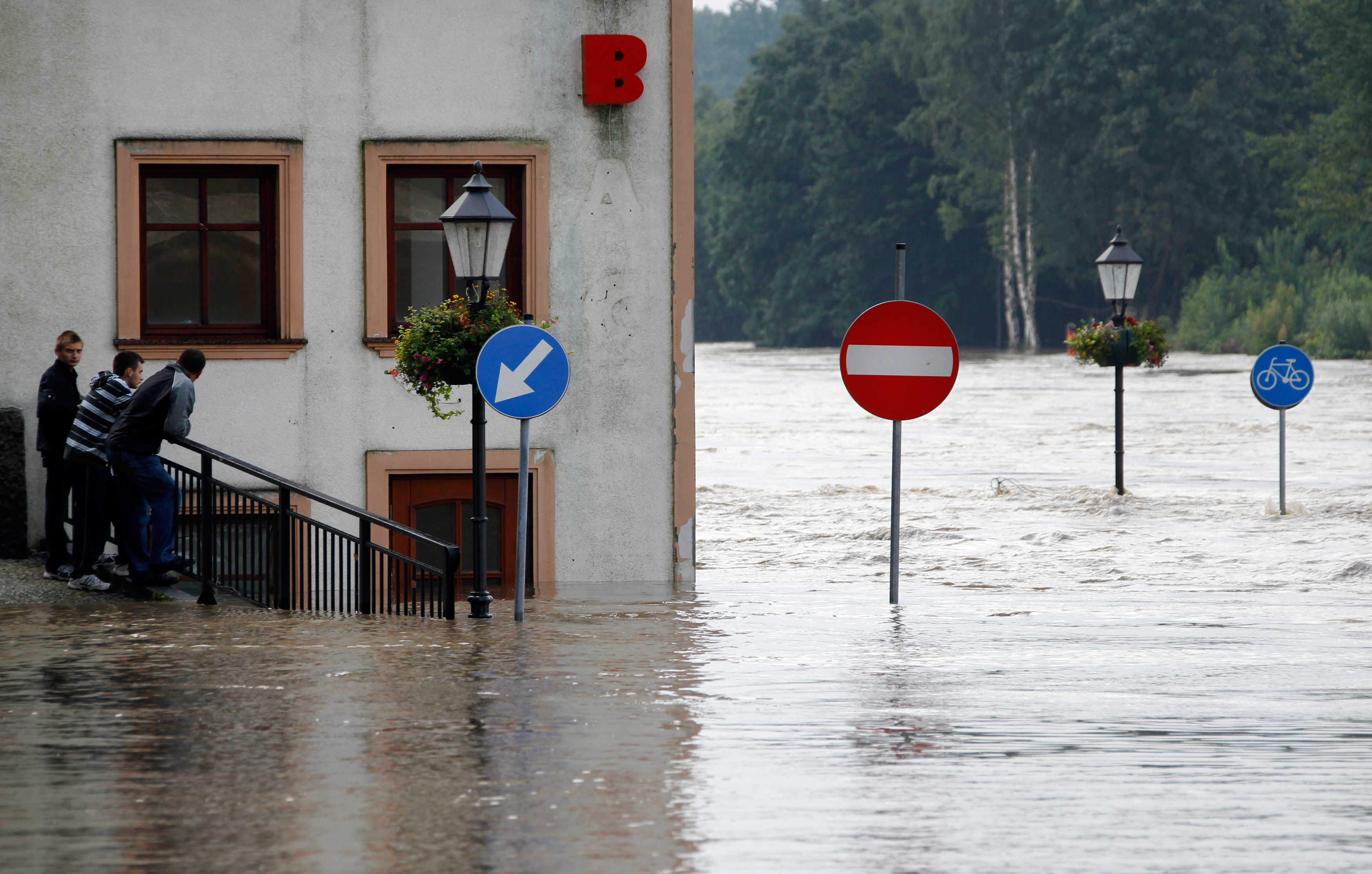
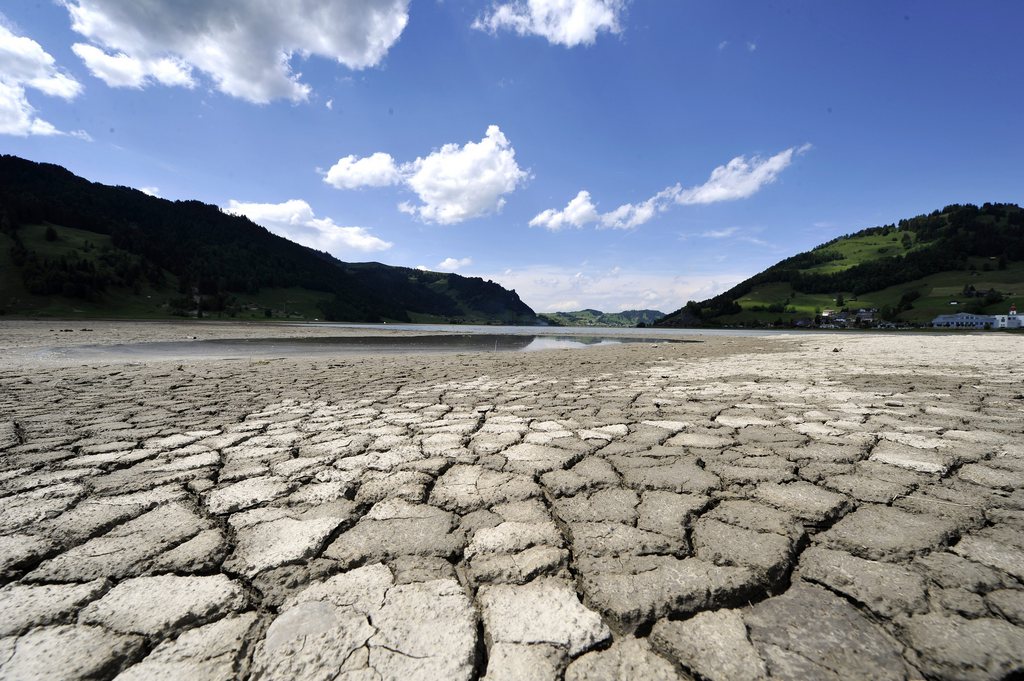
You can find an overview of ongoing debates with our journalists here . Please join us!
If you want to start a conversation about a topic raised in this article or want to report factual errors, email us at english@swissinfo.ch.